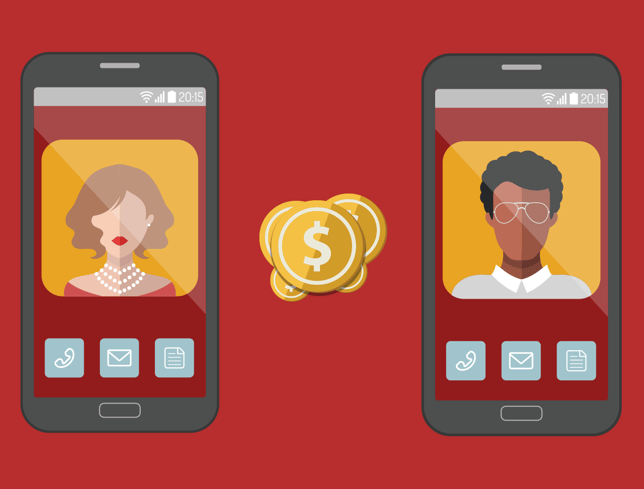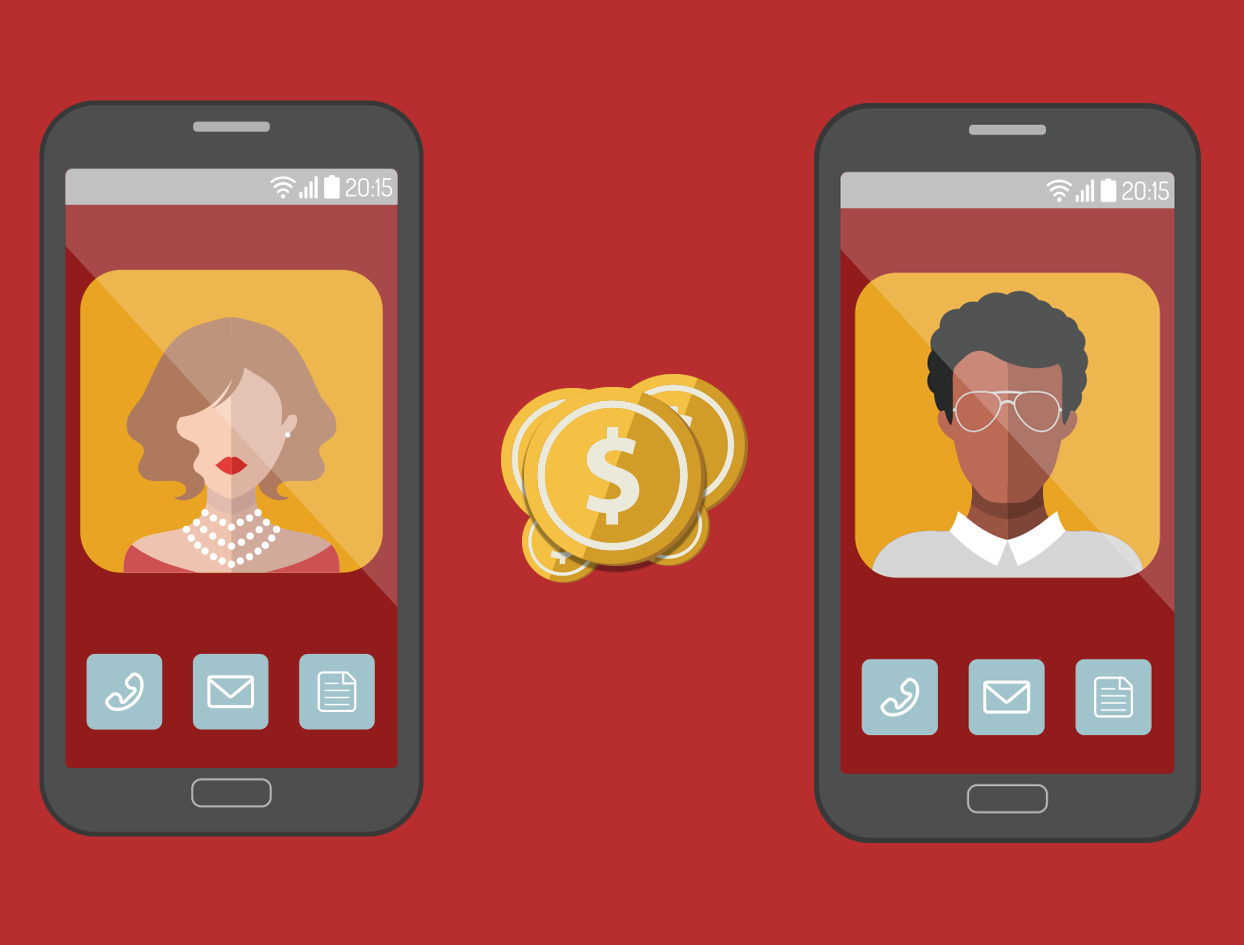 Let's play a game called "Date or Sales Call?" where I share real-life comments with you and you tell me whether you think I heard them while pretending to be interested in baseball and trying to look cute eating a burger or smiling on a phone call so a prospect could "hear my happy."
Let's play a game called "Date or Sales Call?" where I share real-life comments with you and you tell me whether you think I heard them while pretending to be interested in baseball and trying to look cute eating a burger or smiling on a phone call so a prospect could "hear my happy."
"Well, Brittni, I've really enjoyed our time and loved learning more about you. Let's connect again at the end of next week."
"I just don't know. I've been burned before."
"It's not that I don't value you — I just don't have the time right now."
Trick question. These are all things I've heard on sales calls — because dating and sales are the same thing. From honeymoon phases to ghosting, the similarities are obvious.
Regardless of the state of your love life, recognizing the parallels between sales and dating can help you become better at your role in both. And whether you ultimately decide to pursue or bid adieu, there's hidden value in approaching sales the same way you'd begin a relationship with someone new.
Here are six dating principles I've learned that have made me a better salesperson — and can help you, too:
1. Get to know each other.
When you're Facebook creeping conducting important research on your date, you can only learn so much — especially when the page is private. (Hello, girl in profile picture, are you his sister or ex?)
The discovery process is the same way. You may be able to dive into a website and get some insights to start your conversation, but like a well-crafted Insta filter, you're getting only what that company wants to present to you.
When you're talking to an actual human being — a date or a lead — you have to focus on the person. The entire discovery process has to be permeated by the narrative of the client. It's not about you.
By the time you get on the phone with a lead, that person has probably had some kind of touchpoint with 15 trillion salespeople just like you. To paraphrase Taking Back Sunday, salespeople like you are a dime a dozen.
So before you ever start your pitch about your services, you have to know who you're talking to. Find out what that person's day-to-day is like. What is he or she up against internally? What's frustrating that person? Only after you know your contact can you actually connect with leads.
2. Gauge interest and compatibility.
If you did your homework during the discovery phase, you should have a good idea of where your services and your contact's needs meet — but is it mutual? You may be one of many vendors your prospect is swiping right on, so how do you determine whether this is just a hook-up or the prospect is in it for real?
For starters, have the budget talk early on. Much like the "define the relationship" talk, establishing the budget for your services is like a stamp that reminds everyone that this is official. If you're on your second or third call and haven't talked budget yet, you'll only have yourself to blame when you pour your heart and soul into a proposal only to hear, "Oh. We didn't know it was this expensive. I really wish we could have worked together, but this just won't work.” Ugh, after all we've been through together?!
But a relationship-defining talk doesn't mean you're necessarily compatible. Sure, while the prospect may have the budget and you have sales goals to hit, to say, "I want to work with your company because you've got a huge budget," is a lot like saying, "I want to date you because you're hot."
Whether it's your biological clock or your end-of-month sales goal looming, you may be tempted to settle. Despite what my well-meaning grandma would tell you — "Do you think I'll die before you get married or nah?" — you are more than your fertility, and your company's services are more valuable than commission for commission's sake. Look past the surface, and figure out what it will actually be like to work together once the excitement of a new relationship wears off.
3. Get over yourself.
There's a lot of bad advice out there about dating. Really, any advice that compares dating to a game is already heinous. What are you winning? The notoriety of caring the least? No one wants on their epitaph "Here lies Brittni Kinney. She lacked empathy and compassion and made many a man feel discarded."
So it goes in sales. Your VP is never going to stand up at your meetings and say, "Everyone! Please applaud Mort. All of his leads are appropriately confused. Is he into them, or could he really not care less? He hasn't made a single sale, but thank goodness we don't look desperate!" There is no shame in being transparent. You want this company's business — what's so awful about that?
Signal that you're in it to win it by being open about your intentions. With every call you schedule, lay out exactly what you plan to achieve. If it's your first call, tell the prospect that you'd like to see whether you're a good fit for each other. If you have a proposal out, communicate that you'd like to use this call to go over that proposal together.
And part of being open is following up consistently. In dating, people get weird about this because they're afraid of looking needy. In reality, it isn't lame to be secure enough in yourself to say, "We have something good here. Let's keep it going." It's honest. So don't let the "wait four days after your date to call" rule stop you from getting back to the prospect. Get over yourself and just follow up already.
4. Don't get resource-zoned.
So you're hitting it off with a lead, and you can see that he's super into your blog and gated content. Your initial email exchange is fire. He loves your company and would love to get on the phone with you.
Don't start drawing hearts on your notebook just yet. This lead could just see you as a really good resource. He trusts your company and totally sees the value of your services, but he's good on his own for now.
Spot this type of lead early on by looking for the one who's happy to take any resource or introduction you're willing to give but leaves you wondering whether anything has changed since the last time you spoke. If no next steps are in place, you're probably being resource-zoned.
Often, this lead isn't the decision maker. If he's not, ask for an introduction to the right person. If this guy is the right person but things aren't working out, shut it down. Don't waste your time or energy on a lead that isn't wiling to invest time or energy in you, too.
5. Set clear long-term expectations.
During the sales process, you're working with a lead when everything is new, she's excited, ambitions are high, and there's nothing you two can't accomplish together. But we all know that momentum ebbs and flows.
It's your job as a salesperson to set clear, realistic expectations so this relationship moves forward even in a year when your client is out of the honeymoon phase and your account services team is managing the account.
Recently, an international lead reached out to me, and due to the substantial time difference, we had a hard time connecting and finally settled on 8:30 p.m. my time (because I am a dedicated, valuable saleswoman — and maybe my only plans were to rewatch "Community" and eat pizza alone).
We made it work once, but is it reasonable to expect this client's account service team to do the same regularly? And what about time-sensitive projects?
That lead and I probably could have had a great time getting to know each other, but infatuation doesn't conquer all. Ultimately, we decided that it wasn't worth pursuing.
The date-for-fun, no-strings-attached mentality is popular, but it doesn't often lead to long-term commitments. If a serious, committed relationship is what you're looking for — and in sales, it certainly should be — pursue your lead like you intend to enter a long-lasting partnership.
That means setting clear expectations around what it's like to work together. What can this lead expect in one month of working with you? Six months? What do you need from your lead to make that happen, and how much will this cost?
6. If you wanna be my vendor, you gotta get with my friends.
You're on your third call, and you're feeling confident that everything looks good for you and this lead — and then she invites someone else onto the call with you. Maybe it's her marketing director, a developer, or her communications director — whoever it is, you need this person's buy-in as much as you'd need approval from your date's best friend.
Your job is to convince this person that you're not here to replace him or her — you both just want what's best for this lead. But comments like "Aren't we already doing this ourselves?" "How can we even prove ROI?" and "I just don't think we have time for something like this," are complicating things. Your lead was once captivated by you, but even she's starting to question what you're doing here.
Remember that this is normal. Acknowledge the validity of each concern, but remind your prospect what got her excited about working together in the first place. Offer to walk through how your company will work alongside each role to make the lead's team members' lives easier. (Hint: You can use content to overcome objections like these and make conversations easier.)
You don't need Will Smith's character in "Hitch" as a dating coach to close sales (unless you dance like Kevin James. In that case, you absolutely do need that). By applying a few basic principles to your process — like, I don't know, treating leads like people and being honest with them — you can improve your approach and become a better salesperson.
Learn more about how content can improve your sales by downloading your copy of “The Content Marketer's Guide to Sales Enablement” below:




 Let's play a game called "Date or Sales Call?" where I share real-life comments with you and you tell me whether you think I heard them
Let's play a game called "Date or Sales Call?" where I share real-life comments with you and you tell me whether you think I heard them



